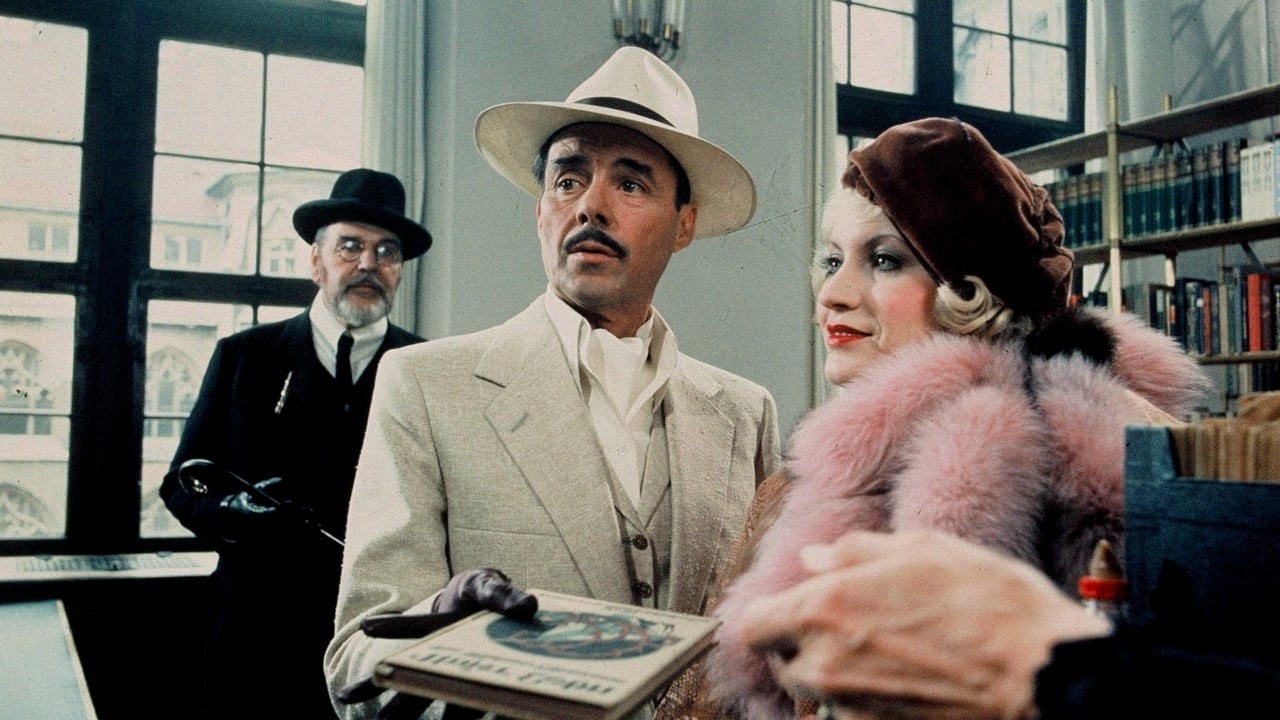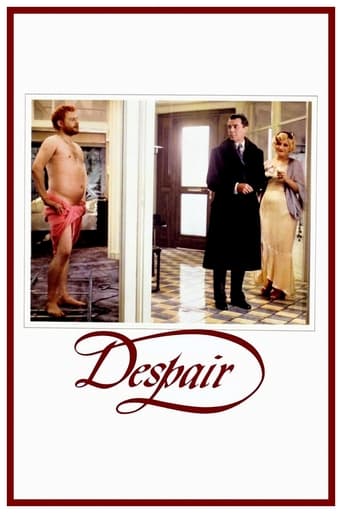

SERIOUSLY. This is what the crap Hollywood still puts out?
... View MoreThe movie's neither hopeful in contrived ways, nor hopeless in different contrived ways. Somehow it manages to be wonderful
... View MoreTrue to its essence, the characters remain on the same line and manage to entertain the viewer, each highlighting their own distinctive qualities or touches.
... View MoreThe story, direction, characters, and writing/dialogue is akin to taking a tranquilizer shot to the neck, but everything else was so well done.
... View MoreBased on a novel by Vladimir Nabokov, Rainer Fassbinder's "Despair" revolves around Hermann Hermann, a Russian emigrant who owns a chocolate factory in 1930s Berlin.Dull and overly melodramatic, "Despair" finds Hermann maritally, culturally and politically disconnected from everyone and everything around him. Trapped in a cycle of work, sex, drugs and chocolate, which he pushes upon grotesque Germans who block out life with all manners of sweetness, Hermann hatches a plan for escape. How? He will find a body double and fake his own death! Death, he hopes, will offer him solace, will end his despair, will constitute an emancipatory journey toward the light! More specifically, death will allow Hermann to escape his bankrupt company, his ditsy wife, his Jewish identity, an increasingly racist Germany and various bourgeois absurdities. To Hermann, death is freedom! Unsurprisingly, the film is dedicated to three artists - Antonin Artaud, Vincent Van Gogh and Unica Zurn - all of whom committed suicide after severe bouts of depression. "If I commit suicide, it will not be to destroy myself," Artaud said before his death, "but to put myself back together again." Some biographers view "Despair" itself as being vaguely autobiographical, Fassinder, who died of a drug overdose, seeking similar escape.Regardless, "Despair" stars Dirk Bogarde as Hermann Hermann. Klaus Lowitsch plays his double, a man who likewise seeks escape, this time from a life of poverty. Lowitsch would play the lead role in Fassbinder's "World on a Wire", another film in which he plays a double and in which life is seen to be a charade. Both "Wire" and "Despair" also end with their leads locked in what their blissful but now insane minds wrongly believe to be "reality". In "Wire", Lowitsch dances in computer simulated rooms. In "Despair", Bogarde sleeps in a grimy apartment up in the Swiss mountains, believing himself to be a movie actor and life to be an elaborate movie production. Hermann's dislocation and disassociation may be complete, but despair never leaves him.6/10 - See 1962's "Lolita".
... View MoreR.W.Fassbinder's first film with an international crew has in the German version the subtitle "Eine Reise Ins Licht" / "A Trip into the Light". If someone desires to know where this astonishing subtitle comes from, he usually gets the answer that Fassbinder meant Hermann Hermanns trip into the land of his release, and actually, the movie itself does little to prove that this assumption may be misleading: it shows pictures in which Hermann unifies with his wife Lydia at the border of the Brienzer- or Thunersee, they look like exactly the light-creatures at the Urdasee at the end of E.T.A. Hoffmann's "Medardus". However, these light-figures also switch, and we realize that Hermann Hermann is exchanged with his "double" Felix Weber whom he had chosen to kill because of his alleged similarity with Hermann in order to cash the insurance money that he was hoping to get from Orlovius because his chocolate factory is bankrupt.So far the outlines of the story. However, one of the most intriguing facts is that "Despair" can be watched in several quite different ways. Taken from outside, it can be seen as a movie about the Russian immigrant H.H., married to his stupid chocolate-binging wife L., having been always a stranger in Germany and going to loose now his company in the beginning of the Nazi era. While he is seriously brooding if the color of the chocolate has similarity with the Nazi uniform and whether the "bitterness" of his Pralinees fits to the Tausendjähriges Reich, he starts to see himself while he is having sex with his wife. In the cinema he sits behind himself, and the movie brings him to the fatal idea to escape bankruptcy by entering a life policy and kill his Doppelganger. However, Hermann does not realize anymore that the man whom he sees, i.e. his real Doppelganger, does not exist outside of his projective brain, he goes out and meets the fairground man Felix who has nothing in common with himself but who is considered by Hermann as his twin-brother.From this point in the movie on, Hermann Hermann starts his "Trip into the Light", and more and more the audience should become clear, that the use of the word "light" by Fassbinder has nothing to do with the usual metaphoric sense of "light" in the sense of "releaf", but is changed into his opposite. Moreover, Fassbinder uses the light here in addition also in a concrete sense, insofar as he shows the place where Hermann's trips ends as a brightly illuminated Swiss Alpine mountain village. This is by the way programmed: We see a picture of the very same village already at the beginning of the movie, it hangs on the wall in the restaurant, where Hermann and Orlovius meet for the first time. The contradiction to the comforting light in the long tradition from the Bible to Bonaventura becomes now suddenly brutally perverted, when we see Hermann at the end more or less imprisoned in his small, dark hotel room with closed shades, sitting at the edge of his bed like a parcel ready to be picked up and telling the police which is coming to arrest him that he is just an actor and will get out of here.Finally, we realize that Fassbinder has created with "Despair" a gigantic anti-Bonaventuran Metaphysics of Darkness, his light being the misleading light at the end of the tunnel which Hermann enters at last when he sees himself doubling his individuality. Only in this interpretation of the light as negative pol, but in no ways in the literal interpretation of the light as positive pole, we understand why "Despair" is dedicated to Antonin Artaud, Vincent van Gogh and Unica Zürn, who all ended their light by suicide, thus traditionally spoken in darkness and not relieved by the light of god who explicitly forbids self-killing. The famous sunflower-fields of Van Gogh, the strenght of the theater of cruelty and the opium-illuminations of Artaud, the Zürn's anagrams by aid of which she pressed sense out of combinatorics --- they all are witnesses of a revolutionary new paring of light with the ethical category of Bad and of darkness with the ethical category of Good, and thus the subversion of the logical and ethical correspondences. Was Fassbinder inspired by an often overseen sentence in Unica Zürn's main work "The Man in the Jasmin": "And then I jumped into the light and started to watch myself"?
... View MoreShot in English on a budget that nearly equaled the cost of his first fifteen films, Rainer Werner Fassbinder's Despair has wit and style yet its attempt to recreate the dark, comedic genius of Vladimir Nabokov left me unmoved and uninvolved. Based on Nabokov's novel Despair (apparently intended as a parody of Dostoevsky), and adapted for the screen by Tom Stoppard, the film describes the descent into madness of wealthy chocolate entrepreneur Hermann Herman (Dirk Bogarde). Set in Germany on the eve of the Third Reich, scenes of the Nazis assaulting Jewish-owned businesses are sprinkled throughout the film but to no apparent purpose. Herman has left his Russian home to live in Berlin and constantly fantasizes about the beauty of the Russian winters and whispers `Russia, which we have lost forever...' to his wife, Lydia (Andrea Ferreol). He is a thoroughly unsympathetic character: cold, calculating, and cynical and Mr. Bogarde's exaggerated mannerisms do not make him any easier to appreciate. Much of the film takes place inside Herman's stately bourgeois home. Shots of the characters through glass partitions keep the viewer at a distance and the elegant interiors look like an abandoned mausoleum. Lydia's and Herman's relationship is unconvincing and Fassbinder's repeated descriptions of Lydia as an unintelligent sex object border on misogyny. "The flowers of your sensuality would wilt with intelligence," Herman tells his wife whom he always addresses with condescension. In addition to Lydia, we gradually meet other vivid supporting characters: Lydia's cousin, Ardalion; and Dr. Orlovious, an insurance salesman whom Herman mistakenly thinks is a psychiatrist and opens up to. Herman is convinced that Felix Weber (Klaus Lowitch), a laborer, resembles him as closely as "two drops of blood." though the resemblance is tentative at best (a joke Nabokov wisely saved for his readers until the end of his novella). He has an odd compulsion to observe himself as a stranger and devises a plan to commit the perfect crime, exchanging identities with the worker as a means of escaping his existence. Felix, on the other hand, decides to humor the eccentric Herman with the thought of getting a job. In Despair, Fassbinder constructs a world in the process of falling apart where people march inexorably toward self-destruction and where the journey into light proves to be an illusion. In a world approaching madness, however, Hermann seems to fit perfectly -- no more, no less crazy than the insanity occurring around him.
... View MoreIt's hard for me to stay away from excessive use of superlatives when commenting on what I consider to be Fassbinder's masterpiece. Michael Ballhaus has filmed more than a dozen Fassbinder films, and Despair is a fine example of the value of their collaboration. Several images are stunningly memorable: the water dripping on the eggshells in the sink; the circular tracking shot through the glass walls of Hermann Hermann's office revealing him in his cage; and the auto-voyeurism of Hermann watching himself in bed with his voluptuous, vacant Frau. Doing justice to Nabokov's compelling dialog and canny character studies has been well done before in Kubrick's Lolita, but Tom Stoppard's rendition here was a perfect match for Fassbinder's (and Ballhaus's) visual feast. And if you are somehow not yet a fan of Dirk Bogarde, seeing his performance in Despair will surely make you as ardent an admirer of his work as I have become.
... View More